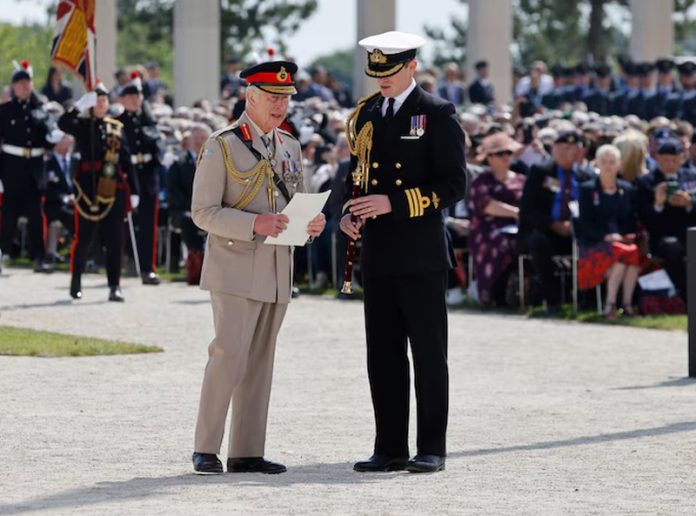VER SUR MER (France), Jun 6 : King Charles III came to northern France on Thursday to honour the 22,442 British troops who died in the Battle of Normandy.
He also came to honour a generation.
It is a generation that sacrificed and fought and died and waited through five long years of war, then sent its youngest and bravest to claw their way onto the Normandy beaches and battle through machine-gun fire and artillery blasts to begin the D-Day invasion of Nazi-occupied Europe on June 6, 1944.
It is also a generation that is quickly passing into history, with the youngest D-Day veterans now nearing their 100th birthdays. That is a reality the king knows firsthand after losing his mother and father, both World War II veterans, over the last three years.
So, Charles on Thursday said thank you, perhaps for the last time, to old soldiers and their missing comrades during ceremonies at the newly completed British Normandy Memorial overlooking the beaches where UK soldiers landed 80 years ago.
He said that while the number of living veterans was dwindling, “our obligation to remember what they stood for and what they achieved for us all can never diminish”.
“Eighty years ago on D-Day, the 6th of June 1944, our nation – and those which stood alongside it – faced what my grandfather, King George VI, described as the supreme test,” Charles said. “How fortunate we were, and the entire free world, that a generation of men and women in the United Kingdom and other allied nations did not flinch when the moment came to face that test.”
The British ceremony featured performances by singers including Tom Jones, as well as testimony from D-Day veterans. Queen Camilla was seen wiping away a tear as actor Martin Freeman read memories of 99-year-old Joe Mines, recalling that “I was 19 when I landed, but I was still a boy”.
Charles, 75, shrugged off his own recent cancer diagnosis to attend the ceremony for British veterans, even though he chose to skip the larger international ceremony a few miles away. Prince William, the heir to the throne, will stand in for the king at that event near Saint-Laurent-sur-Mer, joining heads of state and veterans from around the world to mark the anniversary.
The king is slowly returning to public-facing duties after being sidelined for three months following his cancer diagnosis. While doctors are encouraged by his progress, Charles is still receiving treatment and his schedule will be adjusted as needed to protect his recovery, Buckingham Palace said last month.
With a limited schedule, it’s no surprise that the king chose to focus on the sacrifices of British soldiers.
As commander-in-chief of the armed forces, the king is a symbol of the nation and a unifying force for the military who is above party politics.
Charles, who spent five years in the Royal Navy, also has a deep personal connection to the World War II generation. His father, Prince Philip, served in the navy throughout the war, and his mother, Queen Elizabeth II, trained as a military driver and mechanic during the final months of the conflict. Queen Camilla’s father served in the army and was twice awarded the military cross, Britain’s third-highest military honour.
“Those men and women who took part in D-Day, they weren’t fighting for the government of the day, they were fighting for the Crown,” said Michael Cole, a former BBC royal correspondent who first covered Charles more than 50 years ago.
“The troops swear their loyalty to the king. That’s how it happens. And that’s how it works in this country. So it’s very, very important that the king takes part” in the D-Day services.
The D-Day landings had been a dream of Britain’s wartime prime minister, Winston Churchill, ever since the US entered the war following the Japanese attack on Pearl Harbor on December 7, 1941.
They finally became a reality on June 6, 1944, when almost 160,000 Allied troops from the US, Britain, Canada and nine other countries landed in Normandy. At least 4,414 men were killed and another 5,900 were listed as missing or wounded as Allied forces broke through the Nazis’ heavily fortified “Atlantic Wall” to secure a foothold in Northern Europe.
By the end of August, more than 2 million men had crossed the English Channel, starting the march to Berlin that ended with Germany’s surrender on May 8, 1945.
The king and French President Emmanuel Macron led dignitaries in laying wreaths at the British Normandy Memorial. It sits outside the town of Ver-sur-Mer overlooking Gold Beach, one of three beaches where British troops came ashore on D-Day. Almost 62,000 British troops landed that day, or 40% of the total invasion force.
The names of all 22,442 troops who died under British command during the larger Battle of Normandy are etched on the memorial’s limestone columns. For the 80th anniversary events, 1,475 larger-than-life black silhouettes have been installed around the memorial to represent the British troops who died on D-Day itself.
U.K. Monarchs have taken a leading role in honouring the nation’s war dead ever since Charles’ great-grandfather King George V presided over the burial of an unknown soldier of the First World War at Westminster Abbey in 1920. (AP)


